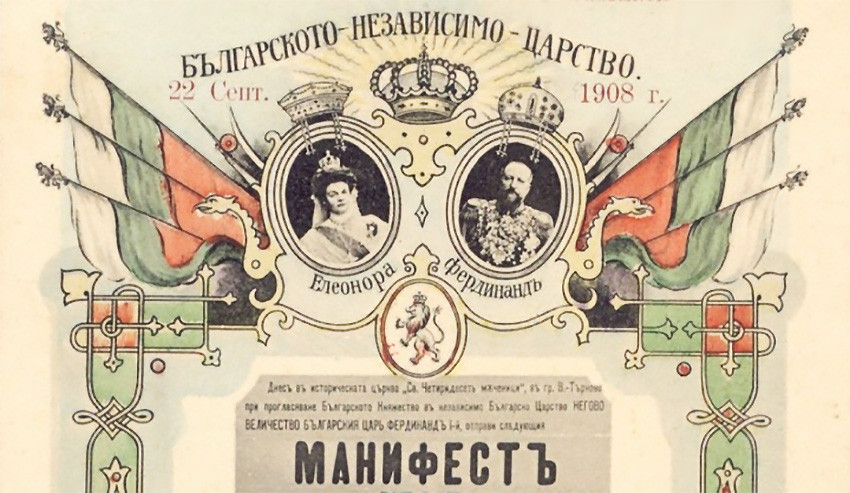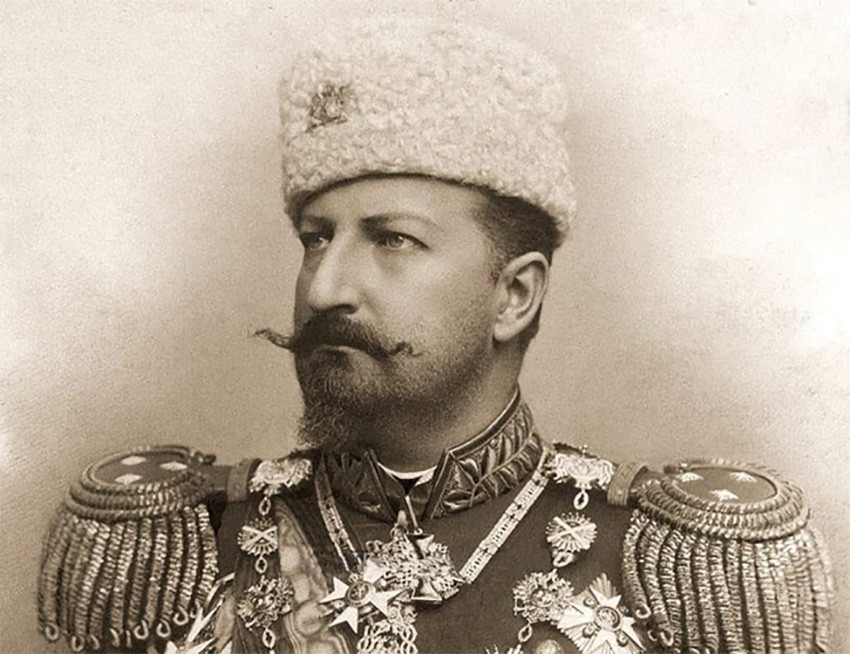Liberation, Unification and Independence are the three acts to which we owe Bulgaria's existence as a free, unified and independent state. From the year of the Russo-Turkish War (1877-78), which liberated our country, three decades passed until the Manifesto for the Declaration of Independence was read out in the old capital of Tarnovo. With this act, Bulgaria finally rejected its political and economic dependence on the Ottoman Empire.
A depiction of the historic day comes to our attention, preserved in an article from the period newspaper "Pryaporets" of September 23, 1908, which states:
At 11 o'clock it was announced to the highly excited crowd that the Prince had stopped at the bus stop on Trapezitsa and from there he and the officials had made their way to the old half-collapsed church of St. Forty Martyrs. Not long after, a prayer was read by all the clergy in the church, which was overflowing with people, the vast majority of whom were standing outside, in the churchyard. Then, after the singing of the "Mnogaya Leta" (Many Happy Returns), and while a sepulchral silence reigned, the Prince, standing forward, read the manifesto. This had the effect of an electric current on the multitude, and a unanimous rapturous "Hurrah!" rang through the air."
But what were the factors that led to the declaration of independence and why were the conditions for this act favourable in 1908?
One of the important prerequisites for the diplomatic victory was that Bulgaria's interests at that time coincided with those of one of the Great Powers - Austria-Hungary - points out Diana Boteva, curator at the New History Department of the Regional History Museum in Ruse:
 "As early as the beginning of 1908 Knyaz Ferdinand appointed the government headed by Alexander Malinov. Appeals for the declaration of independence came from Prime Minister Malinov himself, and at his very first audience with the Knyaz, he declared that the time was opportune for taking action in this direction. However, such an act would also have to have the support of European countries. Austria-Hungary came to the rescue, having an interest in breaking the status quo in the Balkans. Its diplomatic service has been making enquiries with the Great Powers to find out their position on its intention to annex Bosnia and Herzegovina. At these meetings Russia has indicated that it would not interfere with such an act."
"As early as the beginning of 1908 Knyaz Ferdinand appointed the government headed by Alexander Malinov. Appeals for the declaration of independence came from Prime Minister Malinov himself, and at his very first audience with the Knyaz, he declared that the time was opportune for taking action in this direction. However, such an act would also have to have the support of European countries. Austria-Hungary came to the rescue, having an interest in breaking the status quo in the Balkans. Its diplomatic service has been making enquiries with the Great Powers to find out their position on its intention to annex Bosnia and Herzegovina. At these meetings Russia has indicated that it would not interfere with such an act."
We should not overlook several other factors that led to the fulfillment of the national ideal of the Bulgarians at that time - an Independent Bulgarian Kingdom:
"In the summer of 1908 Bulgarian-Turkish relations changed due to the outbreak of the Young Turk Revolution, which succeeded in restoring the constitution of the Ottoman Empire of 1876 - recalled in an interview for Radio Bulgaria Mrs. Boteva - They had a desire to modernize their country, but instead of introducing reforms in the government, they preferred to follow the line of nationalism. Then the Bulgarian diplomatic agent in Constantinople, Ivan Geshov, in a letter to the Bulgarian foreign minister, launched the idea of proclaiming the independence of the country. At that time, however, the government did not share his opinion because it still considered it dangerous for the country. In their view, it was necessary to wait for developments in the Ottoman Empire and to see the reaction of the Great Powers."
The coincidence of the interests of Bulgaria and Austria-Hungary at that time allowed Prince Ferdinand to start negotiations with Emperor Franz Joseph. At their first meeting on 10 September, the prince was greeted as an independent ruler. Apart from this unprecedented gesture, the prince also benefited from a scandal that broke out concerning Bulgaria's diplomatic representative in Constantinople, Ivan Geshov, after which he was ostentatiously recalled from the capital of the Ottoman Empire.
"He was not invited to the reception given on the occasion of the Sultan's birthday, which once again highlighted Bulgaria's vassal status," explains Diana Boteva from the Regional History Museum in Ruse.
In the meantime, Eastern Railway employees began striking on September 5. The protests broke out on the territory of the Principality of Bulgaria, so the railways were nationalized and Bulgaria took over their management. Prime Minister Alexander Malinov sends a telegram to the Knyaz demanding his immediate return to the country from abroad. On 16 September, a the Council of Ministers took a final decision to declare independence. The date chosen for this was September 21, 1908 (but it happened a day later - ed.). There were fears that the Great Powers would engage in collective action because of the problems with the railway. Consideration is also given to the problems the country would have whether it declared independence before or after the Austro-Hungarian took its action. After much discussion, Ferdinand agreed that the only way out of the situation was to declare independence."
Photos: lostbulgaria.com, Wikipedia
Translated and posted by Elizabeth Radkova
On the second day after Easter begins Bright Week. It is so called because of the light that Christ's Resurrection brings to the world. According to Orthodox tradition, it is a time when the Holy Apostles and the Virgin Mary are glorified. Bright Week..
Patriarch Daniil celebrated a divine service for the so-called Second Resurrection of Christ in the Sofia-based church of Saint Nedelya. Patriarch Daniil greets Bulgarians with “Christ is Risen” At the festive liturgy, texts from the Gospel..
Patriarch Danil of Bulgaria, Metropolitan of Sofia, greeted the faithful with the joyful words "Christ is risen!" In his Easter message, he called on Orthodox Christians to share the extraordinary joy of heaven with the world through a life of light and..

+359 2 9336 661
